Alzheimer's linked to glaucoma eye condition

Peering into a patient's eyes could provide a new way to diagnose and track Alzheimer's disease, say scientists.
Researchers detected distinct changes in the retinas of mice that had been genetically engineered to develop Alzheimer's.
A similar loss of retinal cells could be an indicator of the disease in humans, they believe.
"The retina is an extension of the brain so it makes sense to see if the same pathologic processes found in an Alzheimer's brain are also found in the eye," said Dr Scott Turner, from Georgetown University Medical Centre in the US, who took part in the research.
"We know there's an association between glaucoma and Alzheimer's in that both are characterised by loss of neurons, but the mechanisms are not clear.
"This study suggests another path forward in understanding the disease process and could lead to new ways to diagnose or predict Alzheimer's that could be as simple as looking into the eyes."
Glaucoma, a vision loss condition caused by damage to the optic nerve, is increasingly being viewed as a neurodegenerative disorder similar to Alzheimer's.
The new study focused on two parts of the retina, called the inner nuclear layer and the retinal ganglion layer.
Each showed a significant loss of thickness associated with Alzheimer's in the mice. Compared with healthy control animals, the inner nuclear layer suffered a 37% loss of neurons and the ganglion layer a 49% loss.
The findings were presented at the Society for Neuroscience annual meeting in San Diego, California.
In humans, the structure and thickness of the retina can be measured using a technique called optical coherence tomography.
Dr Turner added that it was possible new treatments developed for Alzheimer's may also be useful for glaucoma.
PA
Join our commenting forum
Join thought-provoking conversations, follow other Independent readers and see their replies
Comments
Bookmark popover
Removed from bookmarks